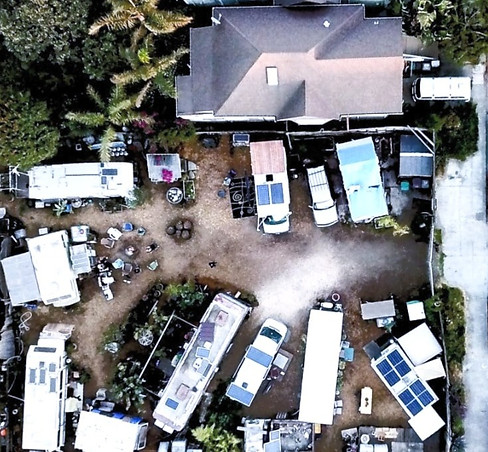"No Parking" Tiny Home Community
2015-2022
This Community Garden Space was created in the spring of 2015 to provide the following to its subscription members:
-
Safe and secure space for personal Tiny House projects
-
Financially accessible membership rates
-
Opportunities to collectively experiment in regenerative environmental systems
What was once known as Neighborship “No Parking” at 1778 10th Street was a 9 space Community and affordable housing experiment that served over 40 individuals in its history. Due to financial pressure imposed by the City of Oakland, the site shutdown in October 2022.


In the News
-
Trailer Park Community in Oakland Faces Uncertain Future NBC Bay Area April 26, 2021
-
Oakland: Why the city may shut down this unusual housing solution Mercury News April 26, 2021
-
OAKLAND BLIGHT LAWS PUT RV INHABITANTS AT RISK OF EVICTION Street Spirit June 1, 2021
-
Oakland leaders want to legalize more types of housing, including RVs and tiny homes Oaklandside June 1, 2021
-
City leaders’ proposal would allow RVs, mobile homes on private property in Oakland Mercury News June 1, 2021


History
Neighborship “No Parking” was a long-time Tiny Home Community in West Oakland designed for low-income Oakland Tiny Home enthusiasts seeking a stable place to call home. It served as space for 9 Tiny Homes to park in Community on a roughly 10,000 sq ft lot with shared amenities of internet, water, trash service, an outdoor shower, common garden space, an outdoor kitchen, fire pit, composting facility, shared sanitation toilet, and space for chickens, ducks, bees, and rabbits. The site was never connected to grid power, nor a sewer line, so each Tiny Home employed its own micro solar system and battery bank and the community maintained a larger 3-kilowatt system that tied into a 48-volt battery bank built from a used Nissan Leafe electric car battery.
Residents who owned their own Tiny homes which included the gammit of Van’s, buses, trailers, RV’s and wood framed TV-show homes on wheels, paid an average $400 a month to stay at the site contributing to the collective bills of around $3,000 per month to operate the site. Despite its practicality in the face of an escalating housing affordability crisis, the site violated outdated “blight codes,” and because of the vulnerability to City of Oakland Code Enforcement and fines, the community made the decision to stay secret about their space.
This was unfortunate because the site had developed over the course of its history from 2015 to 2022, a site and a set of practices that would be very useful to their immediate neighbors in the event of a natural disaster. It’s off-grid energy system could be used to charge phones and electronics during a power outage, its greywater propane-powered shower and pump out toilet could have been useful to neighbors without working plumbing during a disaster. Its space and materials to grow food could have been expanded and turned into stored food for neighbors. In addition, it could have served as a meeting site for Neighbors to plan and prep themselves for the next big one.
In 2021 the City of Oakland changed its blight codes and created a permitted path for communities like “No Parking,” after a series of ill-timed Code Enforcement and fines to “No Parking” and other Tiny Home locations during the early part of the pandemic and the resulting news coverage and political organizing. “No Parking” was now out and in a position to be more engaged with its immediate neighbors and planned to make their Community a resource to the neighbors in the form of a Resiliency Hub.
However, in the summer of 2022, No Parking had to make the unfortunate decision to close down. The permit path that would remove outstanding fines on the land would have required an estimated $150,000 investment to bring a sewer line in and pay for all the unnecessary fees planning departments require for developments. The landowner was already suffering from escalating fines without clarity or trust that they would be removed, in addition to a $12,000 Vacant Parcel Tax for the site that not only wasn’t vacant but was doing what the tax was designed to raise money for - address the housing affordability crisis. In addition, the Community could no longer pay the landlord back for the fees and excess taxes and could no longer attract stable people willing to contribute to the space given all the uncertainty. On October 10th, 2022, the last few Tiny Homes moved off and the site returned to the City of Oakland’s preferred status-vacant.